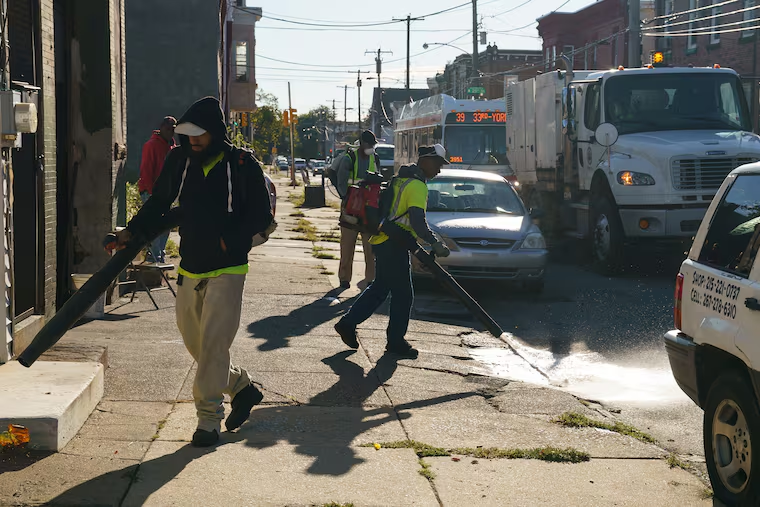Get ready to move your cars, Philly: Street sweeping will include parking restrictions this year
Residents in some Philadelphia neighborhoods will have to start moving their cars for street sweeping this summer.

Residents in some Philadelphia neighborhoods will have to start moving their cars for street sweeping this summer, the city announced Thursday.
The Streets Department will expand a pilot street-cleaning program that began in six neighborhoods last year, Streets Commissioner Carlton Williams said, but with parking restrictions added. The pilot program used leaf blowers to move trash around cars instead of requiring residents to move them for sweeping equipment. As a result, the cleaning took too long and got off schedule, Williams said.
“You have to move your cars,” he said, but leaf blowers, which drew criticism for kicking up debris and dirt, will still be used — especially this spring, before parking restrictions go into effect. The neighborhoods and streets that will get parking restrictions have not yet been determined, Williams told reporters.
Williams’ announcement came after Mayor Jim Kenney promised in an inaugural address to start his second term to expand street sweeping, including parking restrictions, citywide by the end of his term in 2023.
But citywide sweeping will not begin just yet.
“It takes a lot of manpower and money, and of course there’s so many other priorities across the city,” said Anjali Chainani, director of policy for the mayor’s office.
Williams said he hopes to “at least double the size” of the pilot program for this year’s sweeping efforts, but neighborhoods and budget details have not been finalized. Neighborhoods in the pilot program, chosen because they had the most litter, included parts of West Philadelphia, Southwest Philadelphia, Kensington, Strawberry Mansion, Logan, and South Philadelphia.
The city plans to resume the pilot program in those neighborhoods in April, without parking restrictions. Signs requiring alternate side parking for two-hour periods on weekly street-cleaning days will go up in neighborhoods this spring, Williams said, but cars will not need to be moved until July, and tickets will not be issued until August.
“We want to get this right,” Williams said. “If you think about the program maybe a decade or so ago, one of the problems was that it was not very well coordinated.”
Philadelphia stopped its residential street-sweeping program in 2008 due to citywide budget cuts. All of the 30 most populous cities in the United States have a street-sweeping program, and 80% of those cities sweep residential streets at least once per year. Half of those cities enforce parking restrictions, according to Philadelphia’s review of other cities’ programs.
Scott Petri, executive director of the Philadelphia Parking Authority, said enforcement officers would coordinate with the sweeping crews and travel alongside them, so residents are ticketed only if they are in the way of sweeping trucks.
“We’ll be immediately in front of the sweepers,” Petri said.
Tickets for street-sweeping violations are $31. Cars would not be towed.
The city released a report Thursday on the sweeping program, which began in April and continued through November. Of more than 2,000 residents who responded to a city survey in the pilot program’s neighborhoods, 91% said they would support moving cars on street-sweeping days, and 96% said they would support expanding the pilot program citywide.
Despite criticism of the leaf blowers, the report found that 92% of residents supported the use of backpack blowers. The city said it was interested in continuing to monitor their use “to be responsive to any impact on the environment or on the users."
The report released Thursday found that during the pilot program, the amount of trash collected per day decreased and the distance that mechanical broom trucks covered per day increased.
» READ MORE: Mike Newall: Of course Philly’s street-sweeping trucks don’t fit down our streets.
The pilot program had a $2.3 million budget. The city said that $1.3 million was used to hire new full-time laborers and the rest to purchase new equipment, including mechanical broom trucks and backpack blowers. The city had six sweeping crews, at a daily operational cost of about $8,000 for all of them.
Williams said the city has already purchased additional mechanical brooms, as well as smaller trucks that can fit down the city’s narrowest streets.
The pilot program’s impact on the city’s litter index, which tracks the amount of litter on streets, was difficult to assess, the report found. The six neighborhoods in the pilot program had the highest litter index ratings prior to the start of sweeping last year, and the litter index did not show pilot areas getting cleaner than other areas.
Officials suggested that more frequent litter index surveys could better track the progress of street sweeping in the future.
The report also suggested doing more resident surveys about the sweeping program as it continues in 2020, and conducting another evaluation of the overall program at the end of the year.